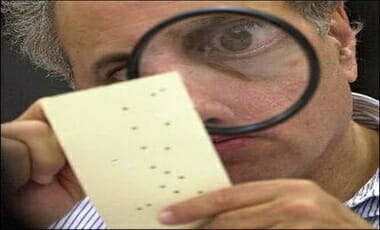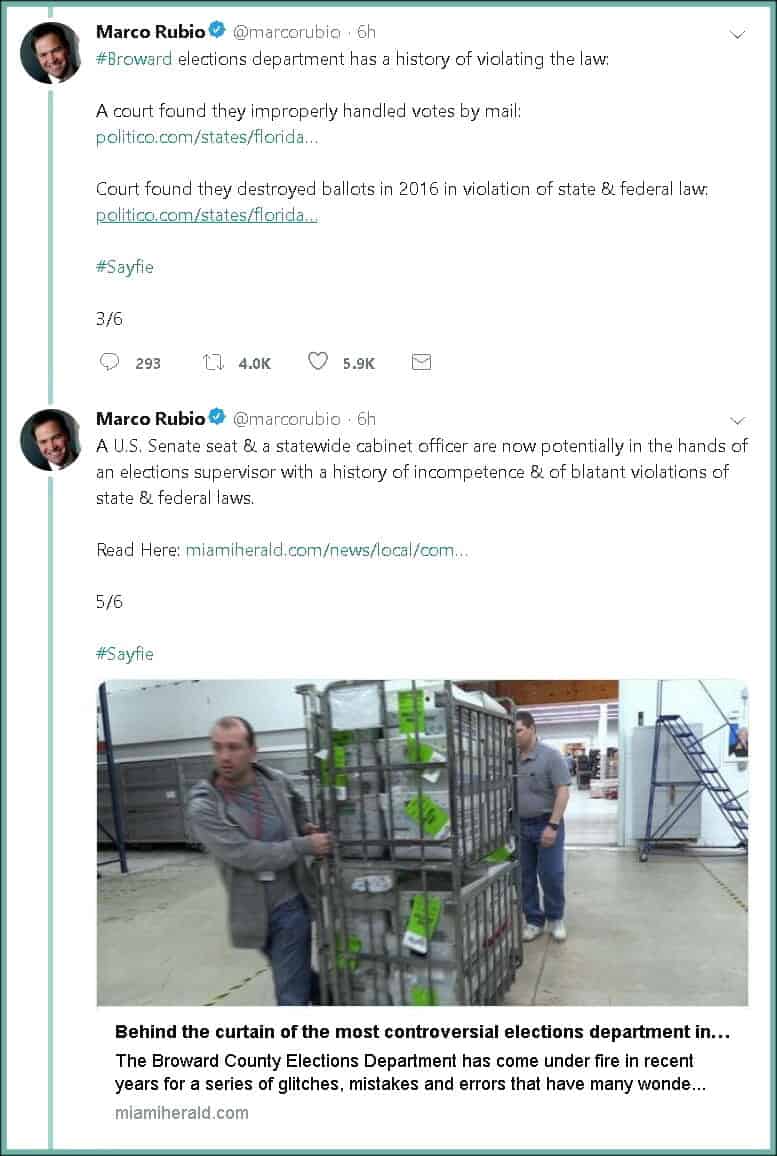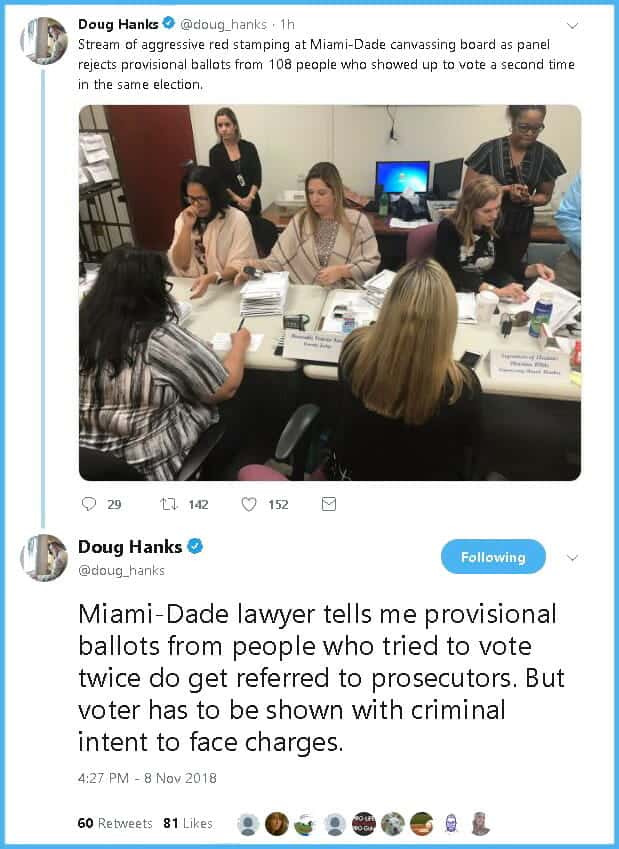Despite committing a string of arrestable offenses on campus before the Florida school shooting, Nikolas Cruz was able to escape the attention of law enforcement, pass a background check and purchase the weapon he used to slaughter three staff members and 14 fellow students because of Obama administration efforts to make school discipline more lenient.
Documents reviewed by RealClearInvestigations and interviews show that his school district in Florida’s Broward County was in the vanguard of a strategy, adopted by more than 50 other major school districts nationwide, allowing thousands of troubled, often violent, students to commit crimes without legal consequence. The aim was to slow the “school-to-prison pipeline.”
“He had a clean record, so alarm bells didn’t go off when they looked him up in the system,” veteran FBI agent Michael Biasello told RCI. “HE PROBABLY WOULDN’T HAVE BEEN ABLE TO BUY THE MURDER WEAPON IF THE SCHOOL HAD REFERRED HIM TO LAW ENFORCEMENT.”
Disclosures about the strategy add a central new element to the Parkland shooting story: It’s not just one of official failings at many levels and of America’s deep divide over guns, but also one of deliberate federal policy gone awry.
In 2013, the year before Cruz entered high school, the Broward County school system rewrote its discipline policy to make it much more difficult for administrators to suspend or expel problem students, or for campus police to arrest them for misdemeanors– including some of the crimes Cruz allegedly committed in the years and months leading up to the deadly Feb. 14 shooting at his Fort Lauderdale-area school.
The new policy resulted from an Obama administration effort begun in 2011 to keep students in school and improve racial outcomes (timeline here), and came against a backdrop of other efforts to rein in perceived excesses in “zero tolerance” discipline policies, including in Florida.
Broward school Superintendent Robert W. Runcie – a Chicagoan and Harvard graduate with close ties to President Obama and his Education Department – signed an agreement with the county sheriff and other local jurisdictions to trade cops for counseling. Students charged with various misdemeanors, including assault, would now be disciplined through participation in “healing circles,” obstacle courses and other “self-esteem building” exercises.
Asserting that minority students, in particular, were treated unfairly by traditional approaches to school discipline, Runcie’s goal was to slash arrests and ensure that students, no matter how delinquent, graduated without criminal records.
The achievement gap “becomes intensified in the school-to-prison pipeline, where black males are disproportionately represented,” he said at the time. “We’re not going to continue to arrest our kids,” he added. “Once you have an arrest record, it becomes difficult to get scholarships, get a job, or go into the military.”
Broward County Sheriff Scott Israel backed Runcie’s plan to diminish the authority of police in responding to campus crime. A November 2013 video shows him signing the district’s 16-page “collaborative agreement on school discipline,” which lists more than a dozen misdemeanors that can no longer be reported to police, along with five steps police must “exhaust” before even considering placing a student under arrest.
In just a few years, ethnically diverse Broward went from leading the state of Florida in student arrests to boasting one of its lowest school-related incarceration rates. Out-of-school suspensions and expulsions also plummeted.
[….]
In January 2014, his department issued new discipline guidelines strongly recommending that the nation’s schools use law enforcement measures and out-of-school suspensions as a last resort. Announced jointly by Duncan and then-Attorney General Eric Holder, the new procedures came as more than friendly guidance from Uncle Sam – they also came with threats of federal investigations and defunding for districts that refused to fully comply.
In 2015, the White House spotlighted Runcie’s leading role in the effort during a summit called “Rethink School Discipline.” Broward, the nation’s sixth largest school district, is one of 53 major districts across the country to adopt the federal guidelines, WHICH REMAIN IN EFFECT TODAY DUE TO ADMINISTRATIVE RULES DELAYING A PLAN BY THE TRUMP ADMINISTRATION TO WITHDRAW THEM.
[….]
“Broward County adopted a lenient disciplinary policy similar to those adopted by many other districts under pressure from the Obama administration to reduce racial ‘disparities’ in suspensions and expulsions,” said Peter Kirsanow, a black conservative on the U.S. Commission on Civil Rights in Washington. “In many of these districts, the drive to ‘get our numbers right’ has produced disastrous results, with startling increases in both the number and severity of disciplinary offenses, including assaults and beatings of teachers and students.”
For example, in St. Paul, Minn., a high school science teacher was “beaten and choked out” by a 16-year-old student, who allegedly came up behind him, called him a “f–king white cracker,” and put him in a stranglehold, before bashing his head into a concrete wall and pavement. The student, Fon’Tae O’Bannon, got 90 days of electronic home monitoring and anger management counseling for the December 2015 attack.
The instructor, John Ekblad, who has experienced short-term memory loss and hearing problems, blames the Obama-era discipline policies for emboldening criminal behavior, adding that school violence “is still rising out of control.”
In Oklahoma City, which softened student punishments in response to a federal race-bias complaint, “students are yelling, cursing, hitting and screaming at teachers, and nothing is being done,” an Oklahoma City public school teacher said. “These students know there is nothing a teacher can do.”
In Buffalo, New York, a teacher who got kicked in the head by a student said: “We have fights here almost every day. The kids walk around and say, ‘We can’t get suspended – we don’t care what you say.’ ”
Kirsanow said that in just the first year after the Obama administration issued its anti-discipline edict, public schools failed to expel more than 30,000 students who physically attacked teachers or staff across the country. Previously, “if you hit a teach, you’re gone,” he said, but that is no longer the case.
No district has taken this new approach further than Broward County. The core of the approach is a program called PROMISE (Preventing Recidivism through Opportunities, Mentoring, Interventions, Support & Education), which substitutes counseling for criminal detention for students who break the law. According to the district website, the program is “designed to address the unique needs of students who have committed a behavioral infraction that would normally lead to a juvenile delinquency arrest and, therefore, entry into the juvenile justice system.”
The expressed goal of PROMISE is to bring about “reductions in external suspension, expulsions and arrests.” Delinquents who are diverted to the program are essentially absolved of responsibility for their actions. “This approach focuses on the situation as being the problem rather than the individual being the problem,” the website states.
Additional literature reveals that students referred to PROMISE for in-school misdemeanors – including assault, theft, vandalism, underage drinking and drug use – receive a controversial alternative punishment known as restorative justice.
“Rather than focusing on punishment, restorative justice seeks to repair the harm done,” the district explains. Indeed, it isn’t really punishment at all. It’s more like therapy. Delinquents gather in “healing circles” with counselors, and sometimes even the victims of their crime, and talk about their feelings and “root causes” of their anger.
Students who participate in the sessions and respond appropriately to difficult situations are rewarded by counselors with prizes called “choice rewards,” which they select in advance. Parents are asked to chip in money to help pay for the rewards.
Listed among the district’s “restorative justice partners” is the Broward Sheriff’s Office. Deputies and local police officers, as well as court officials, routinely attend meetings with PROMISE leaders, where they receive training in such emotional support programs.
The program also includes a separate juvenile “system of care,” rather than the regular court system, where delinquents and parents are counseled about the consequences of getting caught up in the criminal system.
Broward’s launch of the new initiative synced up with a discipline policy shift advocated by the Justice Department. “A routine school disciplinary infraction should land a student in the principal’s office, not in a police precinct,” asserted Holder in January 2014.
At a press conference in 2015, Duncan described his “good friend” Runcie as courageous for implementing a “new system” to “keep kids in classrooms and out of courtrooms.” “It’s difficult work,” the then-education secretary said, “challenging centuries of institutionalized racism and class inequality.”
Duncan noted that Runcie had partnered with a psychology professor, Phillip Atiba Goff, who has been working with both Broward educators and police officers to become more aware of their “implicit biases” toward minority children.
“Implicit bias exists in all of us,” Runcie said in late 2016, “and we have to be courageous enough to confront it if we are going to meet our goals.” District records reveal Runcie has been putting school leaders and school support personnel through intensive training in “implicit bias, black male success strategies [and] Courageous Conservations about Race.”
[….]
A little more than a month before the Feb. 14 shooting, the FBI hotline received a tip about Cruz being a potential school gunman, but it failed to take action. If he had been previously arrested and booked for the on-campus misdemeanors, the FBI intake specialist handling the call would have seen his violent history in the federal National Crime Information Center database, which includes all state arrests, convictions, warrants and alerts.
“Once the agent, or any officer, entered his name in the NCIC system, his history would have been viewed,” Biasello said.
Though he said the call was “specific and urgent” enough to pass the information on to the bureau’s Miami field office, “the message might have been taken more seriously and escalated up the chain of command if the search turned up a police record.”
Another tip from last September, warning the FBI that a “Nikolas Cruz” had boasted on YouTube he was “going to be a professional school shooter,” also fell through the cracks due to a paucity of information in the system. A spokesman for the Miami division explained that “the FBI conducted database reviews [and] checks but was unable to further identify the person who actually made the comment.”
THE BROWARD COUNTY SHERIFF’S OFFICE RECEIVED AT LEAST 45 CALLS RELATED TO CRUZ AND HIS BROTHER DATING BACK TO 2008 – including a February 2016 call from a neighbor warning he made a threat on Instagram to “shoot up” the high school, and another last November advising he was collecting guns and knives and appeared to be “a school shooter in the making.” Though deputies visited Cruz at his home, they did not try to recover his weapons, despite requests from relatives who feared he planned to use them on his classmates.
Their inaction reflects the Broward department’s embrace of the school district’s approach to student crime. Even in response to a major crime scene, Sheriff Israel agreed to defer to school officials when “feasible” and employ “the least punitive means of discipline” against the perpetrators.
The Broward school board also revised agreements between the district and the school resource officers assigned by the sheriff to ensure that they no longer intervene in misdemeanor incidents to cut down on the number of “arrests for school-based behavior.” (The board also signed an agreement with Fort Lauderdale police to reduce officer involvement in such campus offenses.)
At the 2013 signing ceremony on school discipline, Sheriff Israel lauded the new goals. He vowed to “demolish” the pipeline allegedly funneling students to jail by changing the “culture” of school-related law enforcement.
“WE’VE GOT TO DEMOLISH THIS CYCLE FROM THE SCHOOLHOUSE TO THE JAILHOUSE,” HE SAID, ECHOING RUNCIE, WHO STOOD BEHIND HIM. “OUR KIDS NEED TO BE IN SCHOOLS, NOT JAILS.”
ADDED ISRAEL: “AT THE BROWARD SHERIFF’S OFFICE, WE’RE CHANGING. WE’RE CHANGING THE CULTURE, AND WHAT WE’RE DOING IS WE ARE GONNA MAKE OBSOLETE THE TERM ‘ZERO TOLERANCE.’”………………………..
(READ IT ALL!)



